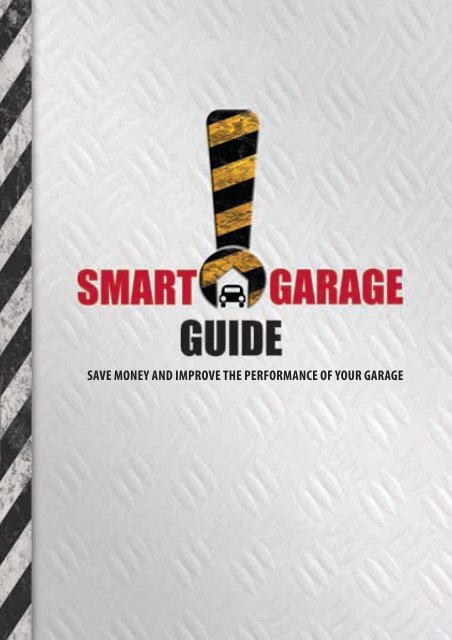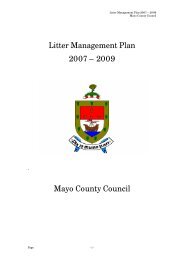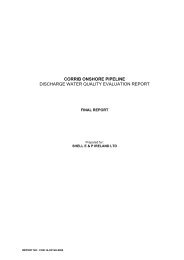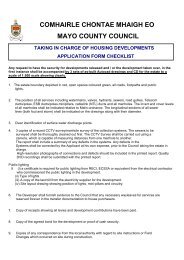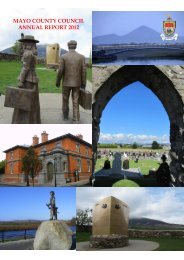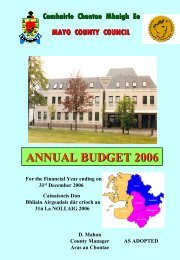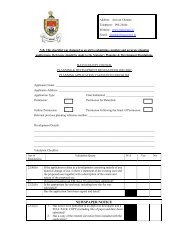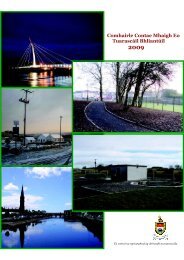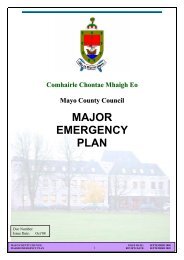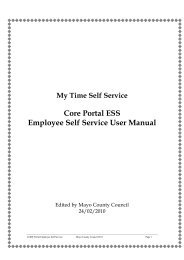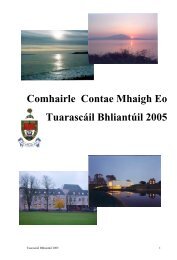Garage Waste (PDF-3169 kb) - Mayo County Council
Garage Waste (PDF-3169 kb) - Mayo County Council
Garage Waste (PDF-3169 kb) - Mayo County Council
Create successful ePaper yourself
Turn your PDF publications into a flip-book with our unique Google optimized e-Paper software.
Smart <strong>Garage</strong> Brochure:Layout 1 27/10/2010 20:50 Page 1SAVE MONEY AND IMPROVE THE PERFORMANCE OF YOUR GARAGE
Smart <strong>Garage</strong> Brochure:Layout 1 27/10/2010 20:50 Page 2The Nuts and Bolts of this BookletThis booklet is aimed at the promotion of best practice in Irish garages. It outlinesthe different ways you can save money through small changes in the way you doyour day to day work. By following the recommendations in this booklet, you cani Save moNeyi make a Safer eNviroNmeNT for people To work iNi SaTiSfy The eNviroNmeNTal lawS ThaT apply To iriSh garageSi reduce The eNviroNmeNTal impacTS of your BuSiNeSSThere are many different wastes produced by the garage sector, many of which arehazardous. This booklet will outline how the various laws apply to each of these andhow to best manage them. By doing this you can cut down on the amount of wastesyou produce, save money and make sure you are not liable to prosecution.
Smart <strong>Garage</strong> Brochure:Layout 1 27/10/2010 20:50 Page 3The booklet deals with the main day to day operations of a typical garage underthe headings of energy, waste, water and documentation. For each of themain headings there is a brief introduction, followed by information on bestpractice options, as well as the laws that apply to each area. At the end of eachsection there is a checklist which outlines:MUST D0!(1) Things you must doThese are the laws.(2) Things you should try and doThese will help improve yourgarage performance and saveyou as much money as possible.TRY TO DO!remember, through preventing wastes you save yourselfmoney and protect the environment at the same time!
Smart <strong>Garage</strong> Brochure:Layout 1 27/10/2010 20:51 Page 4Energy is the main cost for most garages each month. This is mainly due to electricity andwhile there is now increased competition in the electricity market, electricity costs are stillon the rise. The main areas where electricity is used in Irish garages are:45%COMPRESSED AIR32%LIGHTING23%OTHER AREASeach of these main electricity using areas will be discussedindividually. after each there is a checklist to help you helpyou identify saving opportunities.iSaving money on electricity bills!It is easy to make savings on your electricity billsby making sure that these areas are properlymanaged and maintained.One Irish garage reduced their electricity billsby 0% in 6 months by improving the way theyused compressed air and lights around theirgarage. This cost them no money, it justinvolved a change in the way they did things!
Smart <strong>Garage</strong> Brochure:Layout 1 27/10/2010 20:52 Page 5ENERGY - COMPRESSED AIRCompressed Air...Take the pressure off your electricity billsProducing compressed air is expensive as it uses a lotof electricity and is the largest part of most garages’electricity bills. To see the effect compressed air has onyour electricity use, watch your electricity meter the nexttime your compressor kicks in. It flies around comparedwith when the compressor is off. So, you can make bigsavings if you make sure you manage your compressedair properly.35%FIXING LEAKSThese are the main areas where savingscan be made across your compressed air system...32%BETTER CONTROLAND MAINTENANCE 20%IMPROVED AIRTREATMENT 13%OTHER MEASURESfixiNg leakSThe biggest problem, and the biggest waste of money, with compressed air use ingarages is leaks - even a small leak can cost you money. Most leaks are found at fittingsand at joints but small holes in hoses are also common. Usually leaks are not repairedstraight away and, in most cases, they are only patched up and start leaking againquickly.€asy Savings!compressed air leaking througha single 3mm hole could costyou as much as €700 a year!By checking your system regularly forleaks and repairing them straight awayyou can make sure you are not wastingmoney.
Smart <strong>Garage</strong> Brochure:Layout 1 27/10/2010 20:52 Page 6There are 3 main ways to find air leaks:(For the majority of garages the first two options work perfectly well)ENERGY - COMPRESSED AIRlistenBy listening you can identify the majority of leaks. Make sure you do this when it isquiet (after work) and there are no air tools in use. You can also try running yourhand along the line to feel for leaks.lookLooking - if you can’t identify exactly where a leak is by listening, then put somesoapy water along the pipework. Using a sponge, soft paintbrush or spray bottlewill help you cover all joints, flanges and valves. If there is a leak, you should beable to see the soap liquid bubbling up.detectDetection - this is mainly for large complicated sites where ultrasonic leakdetection equipment is the best way to locate all leaks.once you have identified leaks make sure you fix them properly!When repairing any compressed air system make sure you consider the following:✓✓✓✓Compressed air can be dangerous so you should always make sure that the systemis completely de-pressurised before attempting any repair.In low-pressure systems, which are the ones mainly used in garages, it is usuallypossible to ‘patch’ small leaks with a sealant or patch but this repair method shouldonly be a temporary measure.Otherwise, replace or remove damaged fixtures and fittings. Tightenand seal any suspect joints, valves and flanges (use PTFE Teflontape) and then recheck them.If there is little improvement it could be that an internal seal orwasher has perished and needs to be replaced.6
Smart <strong>Garage</strong> Brochure:Layout 1 27/10/2010 20:53 Page 7ENERGY - COMPRESSED AIRTRY TO D0!The following checklist gives you an idea of the easiest ways to makesure you are not wasting electricity and money on compressed air.ELECTRICITY USE BEST PRACTICESwhat you should do with compressed airare youdoing it?Check the compressor, hoses and other piping and fittings for leaks regularly.Weekly is best.Generate compressed air close to where it is used – the longer the pipes thebigger the chance of leaks.Turn air compressors off when they are not needed e.g. lunch time. If there areno leaks in the system the pressure won’t drop.Don’t use too high a pressure in your system – 7 bar should be fine for garagework. The higher the pressure the higher the cost!Take the input air from a cool source – if the compressor is in a hot room, fit apipe that leads outside to supply the air.Clean air inlet filters regularly - these cost only a few cents but can save youeuros!If you are buying a new compressor invest in a good quality type (e.g. variablespeed drive). They are more expensive to buy but cheaper by far in the long run.They are also quieter and this makes a big difference in small garages.Many leaks occur in hoses, especially if they are left on the ground.Use retractable hoses to save on this expense.If you have a public air supply for tyres or use it for a car wash, make sure theseare checked for compressed air leaks daily. These are usually away from the mainpart of the garage and can be leaking for quite a while if not checked regularly.Inform workers of the costs of producing compressed air.7
Smart <strong>Garage</strong> Brochure:Layout 1 27/10/2010 20:55 Page 8ELECTRICITY - LIGHTINGSee the light...and save money from your lightingLights are usually turned on for the whole day ingarages so lighting can be a big part of your electricitycosts. There are three main parts to your lighting: bulbs,housings (reflective fittings) and controls (switches& timers). Obviously bulbs are essential but equallyimportant are the housings and controls. Goodhousings can improve lighting by 100% - this meansyou only use bulbs instead of , allowing you to halveyour costs while maintaining the same level of lighting.People are the main reason for lights being left onwhen they aren't needed. Good lighting controlscan help with this.Before we even get to the electrics, there may besavings to be made on daylight. Many garages haveskylights resulting in much more light getting in withoutthe expense of changing all their lights. Remember,these get dirty over time and they should be cleaned atleast every years. This can make a huge difference.icaSe STudyRecently a large garage wasgoing to change all their fittingsfor brighter lights. Instead theycleaned the skylights with hugeimprovements in the lightgetting in and didn’t need tochange their light fittings at all.In general, there are 3 main ways you can reducENERGY EFFICIENT BULBS • REFLECTIVE
Smart <strong>Garage</strong> Brochure:Layout 1 27/10/2010 20:56 Page 9ELECTRICITY - LIGHTINGenergy efficient BulbsFor most garages bulbs are only changed as the old bulbs fail. If this is the case in yourgarage make sure you replace them with efficient ones - even though they cost more youwill save money every time you use them - especially if you have lights on all day in yourgarage. The costs of completely overhauling your lighting system may not make sense ifyou run a small garage but remember, everyone will make the same saving per bulb.However, if you have a large fleet or franchise garage it may be worth getting an energyaudit done. This will provide advice on all aspects of energy management in your garageas well as costs and payback periods.There are so many types of bulbs now available that it can be very confusing to knowwhat is right for your garage. Most garages will use fluorescent strip bulbs on the ceiling,regular tungsten bulbs for drop lights and work lights and where used, halogen lights inwork stands.icaSe STudyA large Dublin garage recently reducedtheir electricity costs by 17% based onthe lighting changes they made afteran energy audit!as a general rule, if your bulb is giving offa lot of heat then you could probably geta more efficient one. The following pagesgive information on the main bulbs in usein irish garages along with typical savingsyou can make.duce the amount of money you spend on lighting:VE HOUSINGS • LIGHTING CONTROLS
Smart <strong>Garage</strong> Brochure:Layout 1 27/10/2010 20:57 Page 10ELECTRICITY - LIGHTINGBulB Type alTerNaTive commeNTSincandescentor tungsten bulbsa 100w bulbrunning all day will costyou €42 a year.compact fluorescent lights(cfls) & light emitting diodes(leds)a 20w equivalent cfl bulb willcost you €8 a year -SaviNg of €34 per BulBeach yeara 4w equivalent led bulbwill cost you €1.66 a year -SaviNg over €40 per BulBeach year!Tungsten bulbs, the traditional type of bulb,generate a lot of heat when being used.This is a waste of electricity and CFLs, thetypical energy saving bulbs, give off thesame light but generate much less heat.They save up to 70% on electricity costs.while cfls and leds are more expensiveto buy don’t forget they last much longer.compared to an incandescent bulb cflslast 8 times longer and ledS last 20 timeslonger.fluorescent tubea 58w bulbrunning all day will costyou €24 a year.The Smaller T8 and T5fluorescent tubesa 28w T5 equivalent will cost you€12 a year - a SaviNg of €12per TuBe each yearStrip fluorescent bulbs are common ingarages but there are different types andthese use different amounts of electricity.To know how much electricity your bulbs areusing look at the end of the bulb for a numberlike: TLD W/. The important part is theW - this is the amount of electricity used.The lower this number the better. The firstfluorescent tube used was the T-1. Thesewide tubes have been replaced by the narrowerand more efficient T- and T-. T-scan replace T-1s directly, T-s requirechanged fittings or special adaptors.incandescentspot lights ordownlightersa 50w bulbrunning all day will costyou €21 a year.cfls and ledsan 11w equivalent cfl will saveyou €16 per bulb each year whilea 3w led will Save €20Spot lights or downlighters have becomepopular in recent years and are often foundin show rooms and offices. They are veryinefficient and tend to blow or fail a lot dueto the large amount of heat they generate.There are replacement CFLs and LEDs nowavailable. These fit straight into old fittings,use less electricity and due to less heatgenerated last of much longer.while cfls and leds are more expensive tobuy, don’t forget they last much longer!10iask your local electrical supplier for more information on theenergy efficient bulbs and fluorescent tubes they have available.
Smart <strong>Garage</strong> Brochure:Layout 1 27/10/2010 20:59 Page 11ELECTRICITY - LIGHTINGfor the larger garages...Larger garages that are in warehouse type buildings and use external flood lights, couldconsider other alternatives. There are new bulbs coming on the market all the time andthese are designed to save you money on your lighting bills. Some of the newer bulbsare described here.BulBSdischargelampslight emittingdiodes (leds)deScripTioNDischarge lamps, like sodium street lights and the metal halide ones used inwarehouses and larger garages, are very efficient and have a long life span. They areusually take a little time to warm up but use little electricity and are ideal in largegarages where lighting is used all day.LEDs are very efficient lights and are used in all applications. In garages they are nowused regularly for work lights as they are more durable, provide very good clean light,do not generate heat and last much longer.They are now being used for floodlights. While expensive to install they will pay backthe investment in under two years.HousingsHow bulbs are used can be as important as thebulbs themselves. Housings reflect light and agood housing will allow less bulbs to be used (for thesame light given out). As a rule of thumb: good reflectorspermit the removal of two lamps from a dirty four-lamp fixture. If youdon’t have housings for your lights using good reflective paint can be just aseffective.housings are dust traps – so beware!Dirt build-up in garage lights can be significantand this affects both the bulb and housing. Notonly does dust reduce the amount of the lightcoming out (you can lose up to percent of thelight output from a dirty fitting) but it also reducesthe lifetime of the bulbs.Some larger garages use metal halide lights. Theseare usually very high up and can only be accessedwith a cherry picker. Some of these have a glasscover over the fitting - this prevents dirt buildup onthe bulb and the reflectors. If you don’t have these itis a good idea to get them fitted the next time youare changing your bulbs. Make sure to get the fittingscleaned each time you change bulbs.LOSE UP TO35%LIGHTOUTPUTFROM A DIRTYFITTING!11
Smart <strong>Garage</strong> Brochure:Layout 1 27/10/2010 21:00 Page 12ELECTRICITY - LIGHTINGLighting ControlsPeople are good at turning lights on but not so good at turning them off - everyhousehold and business is affected by this. Lighting controls are a good way of reducinglighting costs, especially in areas that don’t need light all the time. The main types ofcontrols are:manual. Make sure that all light switches are labelled. Where possible try not haveall the lights on one switch. Instead arrange lights so that they are controlled in banks -especially if you have light coming into the front of garage where you may not needlights on all the time and have darker areas at the back where lights are needed all day.motion sensors. These are very useful in toilets, stores and other areas that are notused all the time. Lights can be left on all day in these locations without anyone noticing,and motion sensors can eliminate this problem.Time controls. If the working hours in a garage are fixed then it may be worthinstalling a time switch so that most of the lighting is switched off at that time.photo-electric controls. These control lighting based on the amount of naturallight present. These ensure that lighting is turned off when daylight alone providesthe required light.The best control setup is mixed control. In general, a mixed control system (using anumber of the above controls), based on what is best needed in your particular garage.Whatever control systems are chosen you should always have a manual control!TRY TO D0!ELECTRICITY USE BEST PRACTICESwhat you should do with lightingUse energy efficient and long life bulbs - they can give you up to 70% savings on yourelectricity bill.are you doiNgiT?Can fewer lights be used ?Cleaning the lighting housings and/or painting the roof with reflective paint, will givemore light from your fittings.If you have skylights in your garage clean them regularly. You’ll be amazed thedifference this can make.Use timers and motion sensors in areas where lights are used infrequently but are oftenleft on all day, e.g. toilets, stores.Label all light switches.Ensure all lights are turned off when they are not needed (inform staff).1
Smart <strong>Garage</strong> Brochure:Layout 1 27/10/2010 21:01 Page 13The other areasto think about...Even though compressed air and lighting may be yourbiggest costs there are still other ways to make sure youare not wasting money on electricity. For example, manygarages will use plug in 'blow heaters' around the garageand in offices. These are often left on allday and can be expensive to run, especiallyin draughty buildings.One garage saved money by draughtproofing the building and puttinga porch door on the office area tokeep in the heat.The following checklist gives anoverview of some of the differentthings irish garages could do to reducetheir electricity costs.ELECTRICITY - OTHER AREASTRY TO D0!ELECTRICITY USE BEST PRACTICESwhat you should do around the siteRead your electricity meter on the first day of each month and submit thereading to your supplier (by phone or internet) – this means you are onlypaying for what you use each month.Are you on the right electricity tariff? Talk to your supplier to get the best dealfor your garage. Usually the General Purpose tariff is the correct one for Irishgarages.If you charge batteries and other rechargeables then it may be worth being ona General Purpose Night Rate - this has reduced rates for night electricity soyou can charge these for less overnight.are you doiNgiT?Investigate alternative electricity suppliers – there are savings to be made!Examine your bills for wattless charges. If you have wattless charges on yourbill something isn’t working properly (probably a motor on a lift) – get yourelectrician in to check this out.Switch off office equipment when not in use (especially on weekends andholidays).Purchase ‘A’ rated electrical equipment – they may be more expensive to buybut will save you money in the long run.1
Smart <strong>Garage</strong> Brochure:Layout 1 27/10/2010 21:02 Page 14Most Irish garages separate their main hazardous wastes (waste oil and used oil filters)but the majority of other wastes often ends up in either an open skip or wheelie bins.While this is the traditional way of doing things it is also the most expensive way.The cost of mixed wastes has been increasing steadily and in the future is expected toincrease even more. By managing your wastes correctly you should keep as much wasteas possible out of the mixed waste bin - thereby cutting costs.The main types of mixed wastes found in irish garage bins are:38%HAZARDOUSWASTE25%RECYCLABLES 24%METALS13%GENERAL WASTEThrough separating out your metals, recyclables and hazardous wastesthere is the potential to significantly reduce your waste costs. recyclablesare usually collected for free and you can get money back for metals, sothrough good waste segregation you can save a packet.!This is exactly what one <strong>County</strong> Cork garage did recently and halved their monthly waste billcosts. In addition to less waste going out in the mixed waste bins, they now get money back fortheir metals. They saved over €6,000 in 2009 alone!costWhen the garage startedsegregating the wastesJan Feb Mar Apr May Jun Jul Aug Sep Oct Nov Deci and remember, waste management has changed a lot in the past few years and there isvalue in metals and auto batteries. So discuss these with your waste contractors and makesure that you are getting as good a deal as possible. Also, talk to other garages in your areaabout getting your wastes taken away at the same time this will reduce your costs evenfurther.1
Smart <strong>Garage</strong> Brochure:Layout 1 27/10/2010 21:02 Page 15WASTE - MANAGEMENTin this waste section we will go through the main waste types typicallygenerated by irish garages and show you how best to manage your wastesand keep your costs down, while complying with the various laws.First...The most important thing when it comesto mixed wastes is to get rid of a skip ifyou have one. Skips are magnets for waste- both yours and other people’s. If youhave one - go and have a look in it, you’llbe surprised what you’ll find in there. Skipsalways result in poor segregation and poorwaste management.In this picture of a skip from an Irish garage therewas a lot of recyclable materials found. Skips aregreat for fly tipping of bulky goods. <strong>Garage</strong>sgenerally don’t have big bulky wastes so wheeliebins should be plenty. Skip rental is also morethan the cost for a couple of wheelie bins.The lid of this skip is also broken - each time itrains (which it does a lot in Ireland) the rubbishgets wetter, and heavier. Paper and cardboard canweigh times more when wet. Rainwater will alsogather at the bottom of the skip and the heavierit is the more you’ll have to pay more to get ridof it! And while this is very common in skips (evenclosed ones - they are never that well sealed)an open wheelie bin will give you the sameproblems.BIN YOUR SKIP!TRY TO D0!iT haS BeeN fouNd ThaT By removiNg amixed waSTe Skip, your waSTe chargeSwill uSually drop By aT leaST 1/3!1
Smart <strong>Garage</strong> Brochure:Layout 1 27/10/2010 21:03 Page 16WASTE - MANAGEMENTSecond...SEGREGATE YOUR WASTESSegregate your wastes especially metals & recyclables.Of all the wastes generated in garages the one that is most commonly incorrectlythrown into the regular waste bin is metal. If you collect your metal waste separately,then instead of paying for it to be collected, you can get money for it! Things like screws,brake pads (but not the old ones containing asbestos which are hazardous), shavings andany other metal wastes should be kept in a separate container. Usually a waste contractorwill give you a small drum to keep metal waste in - have a chat with them about this.in addition to metal you are required by law to recycle the things that arerecycled at home. The main recyclable materials from garages are:maTerialcardboardpaperplasticsTins and canscommeNTLots of this is generated in garages from motor factor supplies.When cardboard gets wet it can weigh up to times more.If you have a recycling bin always keep it closed.Paper instructions from parts, office paper and newspapers are all commonlygenerated in garages. Like cardboard, store in a recyclable bin and keep dry.While some plastic containers cannot be recycled from garages (e.g. those thatcontain oil) many can be - especially drink bottles, milk bottles, sandwichcontainers. Make sure they have been emptied first.Tin cans can be put in with the metal wastes - this will make you money instead ofcosting you. These are usually quite light in weight but should always be kept out ofthe regular bin.icaSe STudyA lack of space is often the main reason peopledon’t segregate wastes. One Dublin garage hasgot around this problem and have been ableto remove their mixed waste bin completely.They now have bins on a small wheeled unit.Each bin is a different colour - one for metal,one for recyclables and one for hazardouswastes. This can be brought exactly where it isneeded around the garage and saves on timeand hassle for the mechanics.16
Smart <strong>Garage</strong> Brochure:Layout 1 27/10/2010 21:04 Page 17WASTE - MANAGEMENTThird...CONSIDER OTHER AREASConsider the other areas around the garage.i if you have an office and/or a canteen in your garage then don’t forget aboutthem. Canteens are often the biggest producers of waste because of the weightof food waste. Make sure you segregate your food packaging here. Contact yourlocal authority about this or for more information on the regulations visitwww.foodwaste.iei If you have an office, make sure that you print double sided where you can, andalso recycle (or better again, reuse) your printer cartridges.i So, if you manage your wastes properly, then your black bag/bin rubbish should bequite small. As this is expensive, the more you reduce it, the less you pay. If you findyou still have more than you expect, just have a quick look through the bin before itis removed - you’d be surprised what you’ll find in there.i Finally, make sure you talk to your waste contractors about your wastes and howbest to manage them. <strong>Waste</strong> management has changed a lot in the past few yearsand there are savings to be made through good waste management.This checklist summarises the main tips for reducing your mixed waste costs.waSTeSTRY TO D0!GENERAL WASTE BEST PRACTICESwhat you should do around the siteare youdoiNg iT?metalrecyclablesAlways separate your metal wastes - metal is heavy and can cost you if thrownout in the mixed rubbish. Ask your waste contractors if they will take it for free,or better yet, give you money for it.Segregate as much of your recyclable wastes as you can. Using clear plasticbags is good for this. Always try and do your segregation as close to where thewaste is generated as possible. Doing this when you generate it (at source) cansave you money. If space is a problem, consider something like the portablebins shown above.Always keep the lid on your bin or skip closed. Water is heavy and could costyou money to be taken away!general wastesTry and get suppliers to use less packaging and get parts without all theadditional packaging materials - less materials for you to deal with.Use double sided printing and photocopying if you can.Recycle printer and toner cartridges.17
Smart <strong>Garage</strong> Brochure:Layout 1 27/10/2010 21:05 Page 18Finally...MANAGE HAZARDOUS WASTEFinally, and most importantly, manage your Hazardous <strong>Waste</strong>s correctly. There are manydifferent laws that apply to how Irish garages must manage their hazardous wastes.These can be confusing and difficult to figure out. This section will outline how thedifferent types of wastes should be managed and at the end there are a number oftips that can save you money and make sure you comply with all the relevant laws.Some hazardous wastes end up in the general waste bin so make sure you take carewith these. The main ones are:i oily rags should be managed separately as they are hazardous and can catch fireeasily.i oily fines, which is mainly saw dust used to clean up spills around the garage.This should not be thrown in the mixed wastes but managed with the oily rags(oily air filters should also go in with these).i Other hazardous wastes, refers to things that should not have been in thebin - oil filters, aerosols, waste electrical equipment, and oily air filters.your waSTe coNTracTorS aNd your paperworkkeep records when you have hazardous wastes taken from your garage to prove that you havemanaged your hazardous wastes properly. The following 3 points are very important to know.i Make sure you have the relevant waste licence and/or permit numbers from the peoplethat take the hazardous wastes from your garage. You can ask them when they come to yourgarage or get them to send it to you at the start of the year. If they have a licence/permit theymust manage your wastes correctly and it also protects you if they do anything wrong withyour wastes. If you give your hazardous wastes to someone without the appropriatelicence/permit then you may be liable to prosecution. To get a list of companies permittedto collect hazardous waste in your county contact the Environment section of your localauthority.i for waste oil you must keep your records for a minimum of two years and the wastedocket must contain information on the volume/quantity of oil removed.i for all other hazardous wastes you should keep your records for a minimum of 3 yearsand each docket should be accompanied by a form called a ConsignmentNote - or a C1 form. Make sure this is filled out completely by your waste contractor.1WASTE - MANAGEMENTremember, if your hazardous wastes are not managed properly there are seriousconsequences for the garage. There are fines and possible imprisonment foroffenders, so it is important to know what you should do with each different waste.
Smart <strong>Garage</strong> Brochure:Layout 1 27/10/2010 21:06 Page 19Hazardous wastes and how you must manage them!WASTE - MANAGEMENTThis Section goes through the main hazardous wastes that might come from yourgarage and how you must manage them according to laws. More detailed informationis available in the <strong>Garage</strong> Sector Best Practice Guidance Notes document available atwww.epa.ie.hazardouS maTerial MUST D0! Some TipS!WASTE OILIS AHAZARDOUSWASTE!oil filtersalways store waste oil in asuitable drum or metalstorage tanks.Never burn waste oil in a(waste) oil burner - it is illegaland may pose a risk to you andyour employees health.ensure that your waste oil isonly removed by a permittedwaste collector and you alwaysobtain a written record fromthem.keep your oil removal recordsfor at least years.These must be stored separatelyand handled as a hazardouswaste.You must get a properly filledin C1 form when these areremoved.One of the best things formanaging waste oil is anair powered waste oil drainer.These get as muchof the oil out as possible,remove it quicker, reduce spillsalmost completely and as theyare on wheels they are easy tomanoeuvre around yourgarage.keep yourwaste oil tanksor drums in acontained or“bunded” area.This should be awater tight area tocatch spills or leaks.These can be built or you can get simpleunits.Usually these are stored in 0L wheeliebins that your waste contractor will supply.Make sure you drain as much oil aspossible from the used filters.oily solid wastes -like rags, saw dustor air filtersOily solid waste should neverbe thrown into the regularrubbish. They should bestored separately in a drumand treated as a hazardouswaste.You must get a properly filledin C1 form when these areremoved.Currently much of these materials endup in the general rubbish. This is oneof the main areas where garages mayget into legal problems for bad wastemanagement. These can catch fireeasily so treat with care.1
Smart <strong>Garage</strong> Brochure:Layout 1 27/10/2010 21:07 Page 20WASTE - HAZARDOUS MATERIALhazardouS maTerial MUST D0! Some TipS!mixed fuels - petroldiesel, paraffinBrake fluid andantifreezecar batteriesTyresNever mix with waste oils asit can make removal moreexpensive.Body shop wastes (e.g. cleaners,thinners, etc.) should be managedwith these.You must get a properly filledin C1 form when these areremoved.These can have a serious impact onwater supplies and should NEVERbe allowed go to the drain.You must get a properly filled in C1form when these are removed.Make sure your batteries aresourced from validly registeredproducers - you can check atwww.weeeregister.ieIf you supply auto batteries,(even if you are replacing one)you must:• register with an appropriatecompliance scheme• take back batteries similar tothe ones you sell and/or replaceOnly transfer waste batteriesto collectors that are authorisedto collect them.Ensure that these are sent toappropriately permitted orlicensed waste recovery facilities.If you supply tyres make sure youare registered with an appropriatecompliance scheme or with yourlocal authority. There are twocompliance schemes - TRACSand TWM.You must also put up a signindicating which scheme you areinvolved with.Mixed fuels, including solvents from partsdegreasing and cleaning, are classed asVOCs and are therefore hazardous.They should be stored in a UN approvedcontainer as they are volatile and aserious fire hazard.Always take special care when storingand handling fuel recovered from vehicles.If in doubt seek assistance from you localFire Service.Should be stored in a labelled UNapproved container.These are usually topped up during aservice but if the system has to be bledthen these liquids should be storedseparately and not mixed with thewaste fuels or oils.Always store them with the lids on andkeep them out of the rain. Never drainbatteries.If you are storing in a battery box, makesure the lid fits properly and rain waterdoesn’t get in.You can get money back on yourbatteries. you should discuss this withyour hazardous waste contractor.Beware of people calling to your premisesto take them away - make sure they havethe proper paper work. <strong>Waste</strong> batteriesare often stolen from the back of garagesso keep them secure.While tyres aren’t hazardous they are aspecial waste as they cannot be disposedof in landfills.Only transfer waste tyres to appropriatecollectors and ensure these are sent toan appropriately permitted or licensedrecovery facility.0
Smart <strong>Garage</strong> Brochure:Layout 1 27/10/2010 21:08 Page 21WASTE - HAZARDOUS MATERIALother wastes. Other hazardous wastes that are generated in Irish garages,though in smaller quantities, must also be managed accordingly.The following sections briefly outlines these.hazardouS maTerial MUST D0!Small batteriesPutting these batteries into the regular rubbish is a serious problem inIreland. They damage landfill sealants and can poison water supplies.Battery boxes are freely available from WEEE Ireland and ERP Ireland.Also, most co-ops and motor factors will accept these at their counter.waste electrical andelectronic equipmentNot much of this is generated in garages, but what is should be stored andgiven to your local Civic Amenity Site , ERP Ireland or WEEE Ireland.unused airbagsold brake padsfluorescent lightsincluding tubesand cflsaerosolsThese are a hazardous waste due to the fact they are explosive.They have a resale value so should always be kept separatelyand given to your waste collector.Modern brake pads are mainly metal and should be managed with yourwaste metals. Older pads can contain asbestos so beware and contact yourhazardous waste collector for more information on how best to manage them.These should never go in the mixed waste as they contain small amountsof mercury. Even small amounts or mercury can cause huge problemswith water supplies so try and ensure that they are not broken during storage.Most garages use fluorescent tubes but don’t go through enough to have aseparate storage box for them. keep any used ones in a safe place and whenyou have a few ask your hazardous waste contractor about disposal or checkwith your local Civic Amenity Site to see if they are willing to accept them.If you have a large site then it may be worth getting the appropriatestorage coffin bins for storing the tubes.Used aerosols often contain highly flammable or toxic materials. They shouldbe handled separately. As they are pressurised they pose an explosive risk.Should be stored in a UN approved container.macsMobile Air Conditioning (MACs) systems often run on fluorinated greenhousegases, which are major contributors to climate change. Therefore garagesmust take steps to avoid emissions by checking for leaks before and afterservicing.If you service MACs, first you must ensure that there are no leaks or anabnormal amount of refrigerant missing before servicing. Most MAC servicingmachines do a pressure test first and won’t allow the next step unless thepressure test has been done successfully.1
Smart <strong>Garage</strong> Brochure:Layout 1 27/10/2010 21:09 Page 22WASTE - HAZARDOUS MATERIALwaste checklist. The checklists below will help ensure you are complying with all therelevant waste laws. The first one sets out what you must do and the second what youshould consider doing.area HAZARDOUS WASTE - MUST D0!are youdoiNg ThiS?waste contractorswaste oilall otherhazardous wasteshazardouswaste storageBatteriesAll people that remove waste (hazardous and non-hazardous)from your garage must have the correct waste licence and/orwaste permit.keep records of the volumes of waste oils removed from yourgarage for at least years.You must never burn waste oil - either in an oil burner(often called waste oil burners) or in an open fire.keep records of all hazardous wastes removed from your garagefor at least years. This includes a C1 Form which should becorrectly filled in by the contractorMake sure that no hazardous wastes are put into the municipalwaste stream.Make sure that all hazardous waste containers, including waste oildrums, are labelled.Make sure that hazardous wastes are not poured down the sink orinto drains.If you are a supplier of batteries you must fulfil your obligations asset out in the table on page 0.keep all waste batteries intact and do not drain or dismantle.If you supply tyres you must fulfil your obligations as set out inthe table on page 0.Tyrespackagingend of lifevehicles (elvs)Make sure that your collector of waste tyres is correctly permittedwith your local authority. This collector must also either be amember of a tyre compliance scheme (e.g. TRACS or TWM) orregistered with the local authority where they are based underthe tyre regulations.Segregate and recycle your packaging wastes.keep records from your waste contractor for recyclables.If you generate ELVs you must forward them to an AuthorisedTreatment Facility (ATF).mobile airconditioners (mac)If you repair MACs check for leaks before servicing. MAC Servicingshould only be carried out by personnel with the appropriatequalifications. More information is available on www.fgases.ie
Smart <strong>Garage</strong> Brochure:Layout 1 27/10/2010 21:10 Page 23WASTE - HAZARDOUS MATERIALarea HAZARDOUS WASTE - TRY TO D0!are youdoiNg ThiS?waste contractorskeep a written record of all your waste contractors details. Asample table is shown at the back of this booklet.waste oil & hazardouswaste storageStore all waste oil and hazardous wastes in contained (bunded)areas and away from any drains.Store these in the appropriate containers. These are shown inthe Section that deals with Hazardous <strong>Waste</strong>s.hazardous wastestorageHave spill containment and clean-up kits in place.Use different materials for cleaning up water and hazardousliquids e.g. never use a cloth that has been used for cleaningan oil spill to clean a water spill.
Smart <strong>Garage</strong> Brochure:Layout 1 27/10/2010 21:11 Page 24Up until recently most garages were not charged for the water they used. This is changingand with the switch to metered water charges, many garages are realising that water canbe a significant cost. Water use in garages is limited to a small number of areas: taps,toilets, sinks, kitchen, and car washing, and if not managed carefully can be expensive.a tap left on can use as much as 1000 litres an hour. This will cost youabout €2 an hour or nearly €50 a day!icaSe STudyOne kerry garage, after changingto metered water, was chargedover €00 for their first monthsbill. It was found that the cisternin the toilet was leaking and thiswas the reason for the high bill.After fixing the leak the billsdropped to €0 that's a saving of€10 per month.if you have a car wash this will be the obvious source of most water use on sitebut undetected leaks can also be a problem.and even if you have your own well you can still save money by cutting downyour water use - pumping water from your own well uses electricity and this isoften a forgotten cost.So, wheN iT comeS To waTer uSe iN iriShgarageS There are 3 maiN areaS of iNTereST:waTer Supply waTer coNTamiNaTioN car waShiNg
Smart <strong>Garage</strong> Brochure:Layout 1 27/10/2010 21:11 Page 25WATER - SUPPLYwaTer Supply<strong>Garage</strong>s don’t use a lot of water (except in car washes)so water costs should be quite low. If you have a few leaksor leave a tap running overnight, these costs won’t belong in increasing. So by keeping an eye on the common problemsyou can keep your water costs down.The common problems...Like with lights, people are usually good at turning on tapsbut not so good at turning them off. So if you have hosesand taps at the back and side of garages, beware, theseare often left running. Fit on/off nozzles or triggers to allhoses. This stops the hoses running when not used andcan also provide different spray options for different needs.after people, the most common problemsin garages are damaged fittings. replacingthese is often a cheap and quick job.i A faulty toilet can cost as much as €1000a year from leaking water if not fixedwhile a new ball cock will cost you nomore than €1.i A leaking tap, especially a hot water tap,can be very expensive. Hot water cancost as much as 10 times the cost ofcold water.But how do i know if i have a leak?If you are now metered it will bestraight forward to check if you haveleaks. When closing up for the evening orthe weekend make sure that all water isturned off (don't forget to turn off urinals). Then readyour water meter. Read it again first thing the next morning. Ifthere is a difference in the numbers it means there is a leak in yoursystem.
Smart <strong>Garage</strong> Brochure:Layout 1 27/10/2010 22:01 Page 26WATER - SUPPLY EfficiEnt fittings & othEr idEasreplace old or faulty fittingsReplacing old or faulty fittings with high efficiency ones is an easy wayto save money.taps• Self closing taps (the ones with push tops) will always shut off…even when people forget about them!• Aerators on your taps can reduce the amount of water you use byup to 70%. They restrict water flow from your tap without reducingthe water pressure. They cost €5 to fit can save you as much as€ 30 per tap each year.toilets• Most old cisterns use about 15 litres per flush whereas new onesuse 7 litres. By putting a brick, a filled plastic bottle or any otherdisplacement device (e.g. hippo bag) into the cistern (for urinals ortoilets) you can reduce your water use.• Dual flush toilets are now common in modern buildings but not so much in olderbuildings. A retro fit kit can be bought for about €25 and this can save you as much as6 % on your annual water bill - the costs of course depend on how often you use thetoilet!• Urinals are notorious for wasting water – they are often set up to flush much tooregularly, regardless of use. There are a range of devices that can significantly reducethis.harvesting rainwaterRainwater is something we have lots of. Harvesting barrels are an easyway of gathering free water for use around the garage. Barrels can befitted under down pipes or other areas to maximise water collection.They are an ideal way to save some money on your water charges -about the only good thing about all the rain!"if you need more information about any of these talk to yourplumber or visit www.taptips.ieWATER USE BEST PRACTICESWhat you should do around the siteTRY TO D0!If you are fixing or replacing taps, toilets or any other water using equipment try and getefficient equipment. This is especially important for large users like car washing equipment.arE youdoing it?Try gathering rainwater in barrels around your site – it’s free and there is plenty of it.If you have old or leaking fixtures fix them straight away – this is money down the drain.If you have a water meter then use it to check that you don't have leaks in your system.This is easy, turn off all water using equipment, read the meter before you go home andcheck it again the next morning. If there is a change – you have a leak!26
Smart <strong>Garage</strong> Brochure:Layout 1 27/10/2010 21:13 Page 27waTer coNTamiNaTioNOne of the main issues with garages is that they are potential sources ofpotentially dangerous liquid wastes. causing water pollution, or allowingit to happen is illegal. If it happens it can be hugely damaging - both to theenvironment and your pocket!Water pollution is a serious issuefor your locality. If ground - wateris polluted then it is effectivelyruined, and if pollution likeantifreeze gets into rivers it cankill all aquatic life. By properhandling, storage and disposalof liquids you can ensure nopollution of your local watersupply occurs.WATER - CONTAMINATIONin the previous section, options to reduce water use were outlined.here the proper handling for various potential water pollutants are outlined:i If you store waste liquids on site, make sure that thecontainers are stored in a suitably sealed andcontained area. Such areas are referred to as bundedand should hold any liquids that spill or leak from holdingcontainers. This picture shows a wheelie bin where used oilfilters are stored. The bin is leaking and it is on openground. This is dangerous and illegal. For information onbest practice refer to the EPA’s "Guidance note on Storageand Transfer of Materials" available at www.epa.iei If you are close to rivers, streams, ponds, lakes,estuaries, or the sea you must be very careful ofpolluted run off as this could be a cause for prosecution.i Try to keep storage areas covered. Rainwater will carry spills and leaks into localwaterways and sewers. For example, batteries left out in the open can fill with waterand the acid can then run into the local waterways.i clean up spills immediately. If you have a spill, always try to sweep it up first.Then, use sawdust or spill kit materials to absorb the spilt liquids. Make sure thatthese wastes are then disposed of as non liquid oily wastes. They should not go inwith the mixed rubbish.7
Smart <strong>Garage</strong> Brochure:Layout 1 27/10/2010 21:14 Page 28WATER- CONTAMINATIONproper handling for various potential water pollutants continued:i If you have a trade effluent licence or sell petrol/diesel you should have interceptorson your drainage systems. An interceptor removes grease and oil, as well as solidmaterial such as dirt, hair, glass, sand or silt from wastewater before it enters thesewer system. To work properly they should be cleaned regularly and the wasteremoved appropriately. In a garage, this waste is likely to be hazardous.i don’t throw hazardous materials down the sink or toilet - this is illegal andvery polluting. In areas where there is no wastewater treatment this is particularlydangerous to the local supply of drinking water.i Larger generators of wastewater (usually those that wash cars regularly or have acarwash) should have a trade effluent licence. These are issued by your localauthority and will have specific requirements for your particular site.i Make sure everyone in your garage is aware of the potential problems waterpollution can cause, in both legal and local terms.WATER - WHAT YOU MUST DO!are you doiNg iT?If you have a large car wash you probably need a trade discharge licence.Contact your local authority about this.WATER- CARWASHThe use of power or high-pressure washers is common in Irish garageswith the water usually draining to storm water sewers or in many rural sites,directly to surface or ground water. The detergents used and the dirt fromwashing can pollute receiving waters. If you are using these you may needa Trade Effluent License so contact your local authority for more information.iiiiifor power washers and self-service car washes the following should beconsidered:Choose hand-held spray wands and foamy brushes that use no more than 1 litresper minute. (Water Savings: 0% - 0%)Make sure each spray wand, foamy brush, or similar system has a shutoff triggervalve so that the water will not run while the system is not being used.Replace spray nozzles regularly and check for leaks. Repair the leaks as soon as theyoccur.Replace brass or plastic nozzles (which tend to erode more quickly) with stainlesssteel nozzles.Beware of compressed air leaks - car washes are often away from the mainoperation of a garage and air leaks can be overlooked.
Smart <strong>Garage</strong> Brochure:Layout 1 27/10/2010 21:14 Page 29WATER - CARWASHoperating large car washers can be expensive, even after the initial start-upprice has been taken care of. By using efficient water-reducing practices andtechnologies these costs can be reduced.i A good way to cut down on water bills in large car washes is to install a water reusesystem. Potential water savings of between 0% - 0% can be realised. An extrawater saving option when using a water reuse system is to increase the wait time forthe car after the final rinse – this provides a longer period in which to collect rinsewater (and also reduces drying time if a blow drying system is used).i If your car wash uses hot water, it may be an option to use solar panels to heat thewater. Traditional water heating solar panels require a pitched roof facing in asoutherly direction and a hot water storage tank. However stand alone solar panels,which are common in parts of the world where flat roofs are the norm (e.g. Greece,Spain, China), are now in use in Irish farms and other industrial locations. These unitsrequire a cold water feed and because the tank is inbuilt can be put anywhere.TRY TO D0!WATER USE BEST PRACTICES!what you should do if you have a car washIf you have a car wash does it reuse water? Modern car washes use the last rinse waterfrom one wash as the first cleaning water in the next wash – this can save you a lot ofmoney.are youdoiNg iT?If your car wash uses hot water can you use solar water collectors to heat the water – oncethese are installed you get free hot water.If you have a do it yourself car washer make sure that all the hoses and washers haveon/off triggers – customers will often forget about turning off taps and equipment.
Smart <strong>Garage</strong> Brochure:Layout 1 27/10/2010 21:15 Page 30regardless of whether you are having large volumes of waste taken off site or justa small amount, each person that takes away your waste should be able to give youa copy of an up to date waste collection permit. This protects you from any legalissues that may arise if it is found that some of your wastes are managedinappropriately.All wastes that are removed from your garage by a third party, including general rubbishmust have an accompanying written record. remember, for hazardous waste youshould get a waste consignment Note (c1).an inspector from you local authority can call at yourgarage and ask to see your records for the past three years!Your local authority can call at your garage and ask to see your records for the past threeyears. Having all of these records on hand is a tricky thing in most garages - book keepingnot being the strength of most!It is much easier to keep a summary of the relevant information. Across is an exampleof summary sheets for all your waste records. The first table records all the relevantinformation that you must have for your waste contractors and the second willsummarise all the information you should have for the wastes taken from your garage.Remember, you must still keep the original records for at least years.0
Smart <strong>Garage</strong> Brochure:Layout 1 27/10/2010 21:16 Page 31DOCUMENTATION<strong>Waste</strong> Contractor RecordswaSTe TypewaSTecollecTorliceNce/permiTrefereNce NumBeriSSuiNgauThoriTywaSTe oil ABC <strong>Waste</strong> WCP/LL/00/00zwaSTefilTerSABC <strong>Waste</strong>WCP/LL/00/00zcarBaTTerieSA BatteriesWCP/LL/006/0TyreS ABC <strong>Waste</strong> WCP/LL/00/00zgeNeral waSTe ABC <strong>Waste</strong> WCP/LL/00/00z<strong>Waste</strong> RecordswaSTe Type waSTe collecTor volume/amouNT daTewaSTe oil ABC <strong>Waste</strong> 00 Lts 16th JulywaSTefilTerSABC <strong>Waste</strong> 0 kgs 16th JulycarBaTTerieSA Batteries1 x car x truck1th JuneTyreS ABC <strong>Waste</strong> 00 Tyres 11th AugustgeNeral waSTe ABC <strong>Waste</strong> 00kg 1st August1
Smart <strong>Garage</strong> Brochure:Layout 1 27/10/2010 21:17 Page 32DOCUMENTATIONThe law and you...There are many different pieces of legislationthat apply to Irish garages. As a result it canbe difficult to know everything that you mustdo in your garage. The main laws that youmust comply with are set out below andmainly involve waste materials. It has beenfound that by complying with these laws cansave money and make sure you are not liableto large fines.waSTeS how iT affecTS you The lawhazardouSwaSTeS diSpoSalhazardouS waSTeSTorageremoval ofhazardouSwaSTeSBurNiNg ofwaSTe oilrecord keepiNgfor hazardouSwaSTeSrecord STorageThe main hazardous wastes generated in a garagemust be recovered and disposed of appropriately.Hazardous wastes should not be mixed during storageand the appropriate containers used for theiron-site storage.Hazardous waste should only be taken away bya permitted waste collector. Make sure you geta copy of their permit - this is your protectionin case the waste is managed or disposed ofincorrectly afterwards.It is illegal to burn waste oil, either in waste oilburners (often called oil burners) or in open fires.<strong>Waste</strong> oils must not be disposed of to water ordrainage systems.All hazardous wastes removed from your garage,except for waste oils, must have an appropriateconsignment note. These are called C1 forms. Forwaste oils removed from your garage records mustbe kept of volumes removed.Records for waste oils must be kept for at least years. All other hazardous waste records must bekept for at least years. Storage containers must belabelled and hazardous wastes should not be mixedwith each other or general rubbish.<strong>Waste</strong> Management Act16-00<strong>Waste</strong> Management(Collection Permit)Regulations S.I. No. 0of 007 as amended S.I. No.7 of 00<strong>Waste</strong> Management Act16-00 <strong>Waste</strong>Management(Licensing) Regulations000, S.I. No. 1 of 000.<strong>Waste</strong> Management(Movement of Hazardous<strong>Waste</strong>) Regulations 1,S.I. No. 17 of 1<strong>Waste</strong> Management(Hazardous <strong>Waste</strong>)Regulations 1, S.I.No. 16 of 00
Smart <strong>Garage</strong> Brochure:Layout 1 27/10/2010 21:18 Page 33DOCUMENTATIONwaSTeS how iT affecTS you The lawTyreSIf you supply tyres, you must either registerwith TRACS, TWM or with your Local Authority,and comply with the associated requirements.<strong>Waste</strong> Management(Tyres and <strong>Waste</strong> Tyres)Regulations 007, S.I. No. 66 of 007packagiNgmaTerialSPackaging wastes must be segregated atsource and recycled.<strong>Waste</strong> Management(Packaging) Regulations 007,S.I. No. 7 of 007all waSTeSThe burning of waste - either indoors oroutdoors is illegal. Only licensed/permittedfacilities can do this.<strong>Waste</strong> Management(Prohibition of waste disposal byburning) Regulations 00,S.I. No. 6 of 00eNd of lifevehicleSAn End of Life Vehicle can only be transferredto an Authorised Treatment Facility (ATF).Retain a copy of their permit and/or licence.<strong>Waste</strong> Management(End-of-Life Vehicles)Regulations 006, S.I. No. of 006BaTTerieSvehiclerefiNiShiNgIf you sell or supply batteries, you must eitherregister with an appropriate compliancescheme (WEEE Ireland or European RecyclingPlatform (ERP) or with your Local Authority.You must then comply with the associatedrequirements for supply and managementof waste batteries.If you do body work repair on cars youmust have the appropriate AIC compliancecertification. Contact your local authorityfor more information on this.<strong>Waste</strong> Management(Batteries and Accumulators)Regulations 00, S.I. 6 of 00The Limitation of Emissions of VolatileOrganic Compounds due to the useof Organic Solvents in certain paints,varnishes and vehicle refinishingproducts Regulations 007,S.I. No. 1 of 007.waSTe waTerIf your garage discharges waste water fromwashing of automobiles then you may besubject to a Trade Effluent Licence. Contactyour local authority for more information.Local Government (Water Pollution)Act, 177-10moBile aircoNdiTioNiNguNiTS (macS)If you service or repair MAC equipment youmust ensure that the system does not haveleaks and has not lost an abnormal amountof refrigerant before you service it.Emissions from Air ConditioningSystems in Motor Vehicles 70/16/EECand amended by Directive 006/0/EC
Smart <strong>Garage</strong> Brochure:Layout 1 27/10/2010 21:18 Page 34NOTES
Smart <strong>Garage</strong> Brochure:Layout 1 27/10/2010 21:19 Page 35
Smart <strong>Garage</strong> Brochure:Layout 1 27/10/2010 21:19 Page 36for more information on any aspect of this booklet please contact the environment section ofyour local authority.acknowledgementsThe authors would like to acknowledge the time and comments provided by the followingindividuals and groups.Michael Joyce - Connaught Regional <strong>Waste</strong> Management OfficeJames Callery and Moira Byrne - Wicklow <strong>County</strong> <strong>Council</strong>Fiacra Quinn - TRACS IrelandSIMIBrian McDermott – FASThe various garages involved in providing information and agreeing to on-site visits.disclaimerThis document does not purport to be and should not be considered a legal interpretation ofthe legislation referred to herein. Although every effort has been made to ensure the accuracyof the material contained in this publication, complete accuracy cannot be guaranteed. Neither theClean Technology Centre, Environmental Protection Agency or acknowledged parties accepts anyresponsibility whatsoever for loss or damage occasioned, or claimed to have been occasioned, inpart or in full as a consequence of any person acting or refraining from acting, as a result of a mattercontained in this publication. All or part of this publication may be reproduced without further permission,provided the source is acknowledged.copyright© Clean Technology Centre, Cork Institute of Technology 010contact detailsClean Technology Centre,Cork Institute of Technology,Rossa Avenue,Cork,Ireland.Tel.: + 1 6Email: ctc.cork@cit.ieWebsite: www.ctc-cork.iePrinted on 100% recycled paperThis booklet was produced as part of the epa National waste prevention programme (Nwpp)


